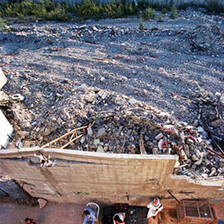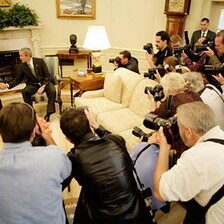Sunday Herald 5 April 2003
http://www.sundayherald.com/32710
Sunday Herald - 06 April 2003
War provides cover for a fresh Israeli crackdown
While the world focuses on Iraq, 17 Palestinians have been killed and more than 1000 detained as Israeli forces step up ‘anti-terrorism’ raids. Robert Tait in Jerusalem reports
————————————————————————————————————
IN Tulkarm, just inside the Palestinian side of the imaginary green line separating the occupied West Bank from Israel proper, few now doubt that the war in Iraq has brought about their worst nightmares.
Early on Wednesday morning, residents in the town’s refugee camp woke to the sound of gunfire, stun grenades and helicopters. The Israeli army had descended in force and for Palestinians, it provided proof that Ariel Sharon, Israel’s hawkish prime minister, was doing what they always said he would — using the US-British war on Iraq as camouflage for a crackdown.
More than 1000 male residents aged 15 to 40 were forced from their homes, taken to a school, frisked and forbidden to return for two days while the army searched their houses for weapons. The raid came three days after a suicide bomber from the town blew himself up in the nearby Israeli resort of Netanya, wounding more than 30 people.
But the sweeping raid provoked a renewal of the ‘war crime’ allegations levelled at Israel over last year’s Operation Defensive Shield, which led to the bloody battle of Jenin and the attacks on Palestinian President Yasser Arafat’s headquarters.
‘We urge the international community not to allow Israel to continue exploiting the war with Iraq to achieve its end goal,’ said Saeb Eerekat, a Palestinian cabinet minister. Israeli left-wingers were equally critical. Yossi Beilin, chairman of the Shahar movement, said the Tulkarm round-up ‘conjures up some chilling memories’.
It was not an isolated Israeli action. On Thursday in Gaza, tanks, armoured vehicles and bulldozers raided Rafah refugee camp, killing four men whom the Israelis said were armed militants. A 14-year-old boy was shot dead in the West Bank town of Qalqilya while, in Nablus, soldiers killed a man they said was a wanted Hamas fighter. In all, 17 Palestinians have been killed since the beginning of the Iraq war, including six children and an elderly man.
Israel said last week’s raids were necessary to dismantle ‘terrorist infrastructure’ in the Palestinian territories and were based on information about planned attacks . But the Gaza incursion came two days after the new Palestinian prime minister designate, Mahmoud Abbas (better known as Abu Mazen), visited the territory trying to persuade Hamas and Islamic Jihad, who both reject dialogue with Israel, to stop suicide attacks while he tries to get peace talks back on track.
Fresh Israeli action — under cover of the Iraq war — hardly seems designed to raise Mazen’s credibility with militant groups, especially at a time when Israel is demanding that he proves he can rein them in before it agrees to deal with him. The timing of the Gaza raid may in fact provide a clue to the Sharon government’s thinking. Israeli security officials do not want to give Mazen credit for the recent drop-off in Palestinian terrorist activity .
Mazen’s appointment was brought about by the Bush administration’s determination to sideline Arafat, whom it blames for triggering the intifada two and a half years ago. Washington has been sending out subtle messages that it likes what it sees of Mazen and this is worrying the Israelis. There are increasing signs that America — and not just Tony Blair — now expects them to make the ‘painful concession’ to the Palestinians which Sharon says he is ready for.
Silvan Shalom, Israel’s foreign minister, returned last week from Washington, where he met President George W Bush and other officials. As ever with US-Israeli meetings, the talks were cordial but there was a chilly message behind the smiles. The Americans told him the peace road map — which envisages a Palestinian state by 2005 and about which Israel has many reservations — will be introduced and is not open for negotiation.
Facing the Israeli media, Shalom put on a brave face, declaring that ‘without the cessation of terrorism, there is no chance of any peace process of any kind’. He also dismissed Blair’s argument that resolving the Israeli-Palestinian issue was a necessary counterweight to the war in Iraq, insisting that Bush too rejected such a link.
But a diplomatic cable from Washington this week suggests that may no longer be true. The cable urged Israel to take action on freezing settlement activity in the occupied West Bank. America had acted in Israel’s interests in tackling Iraq, the communique said, but in so doing had harmed its relations with the Arab world. Getting Israel to act on the settlements — where an estimated 230,000 Jews live on land claimed by Palestinians — was a way of easing those tensions.
Uprooting settlers who believe they are fulfilling their religious destiny is possibly the most painful concession for Sharon, especially in a coalition government containing parties opposed to a Palestinian state.
But if Bush accepts the Blair line that peace in the Middle East is needed to cool Arab passions inflamed by war in Iraq, the Israeli prime minister could be forced to rely on more acts of violence from armed men in the refugee camps to throw Abu Mazen and the road map off track.
Copyright (c) 2003 smg sunday newspapers ltd. no.176088
Back to previous page


